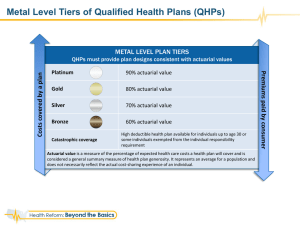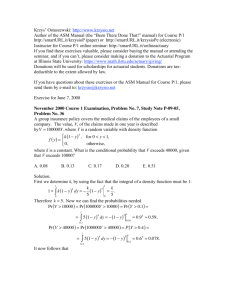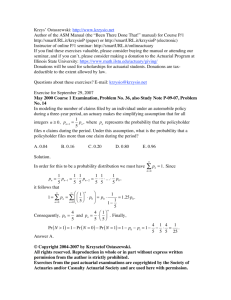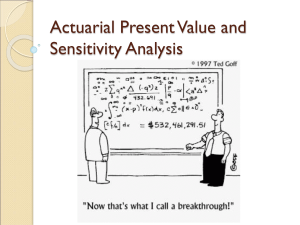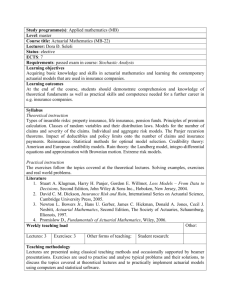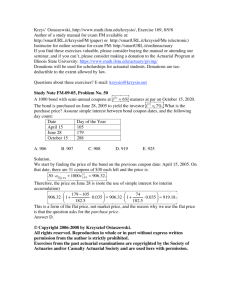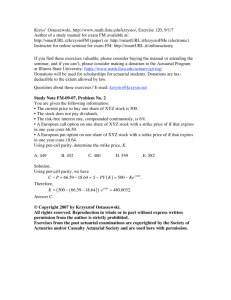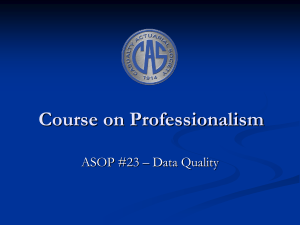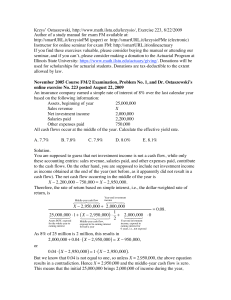MATH 3631 Actuarial Mathematics II MW 3:35
advertisement
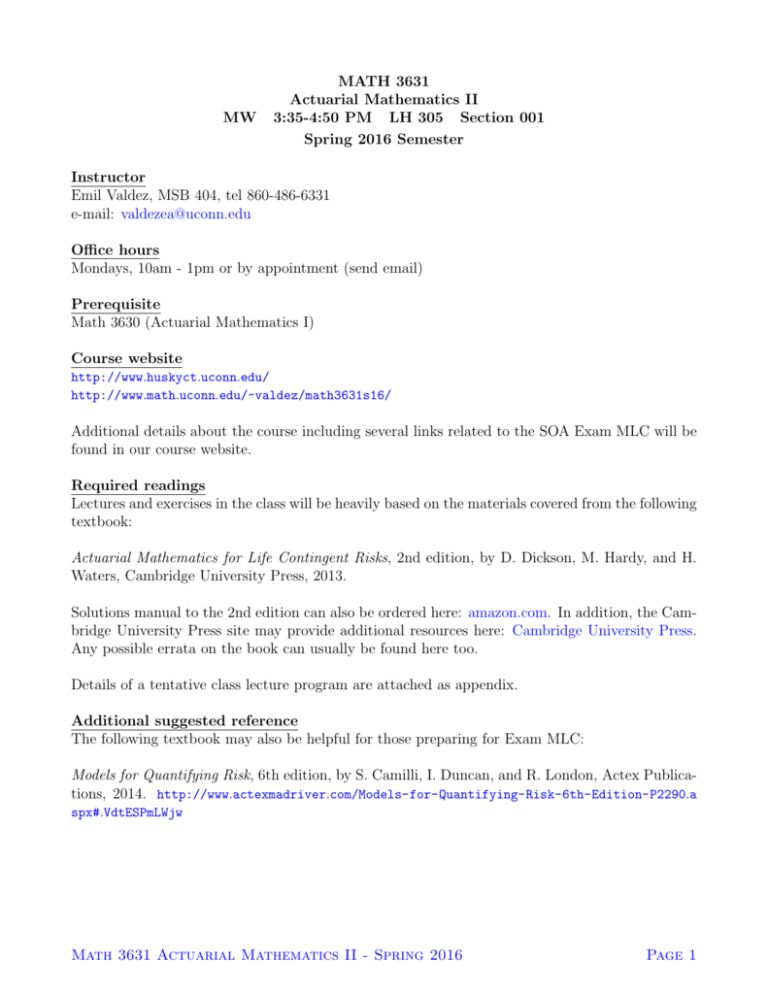
MW MATH 3631 Actuarial Mathematics II 3:35-4:50 PM LH 305 Section 001 Spring 2016 Semester Instructor Emil Valdez, MSB 404, tel 860-486-6331 e-mail: valdezea@uconn.edu Office hours Mondays, 10am - 1pm or by appointment (send email) Prerequisite Math 3630 (Actuarial Mathematics I) Course website http://www.huskyct.uconn.edu/ http://www.math.uconn.edu/~valdez/math3631s16/ Additional details about the course including several links related to the SOA Exam MLC will be found in our course website. Required readings Lectures and exercises in the class will be heavily based on the materials covered from the following textbook: Actuarial Mathematics for Life Contingent Risks, 2nd edition, by D. Dickson, M. Hardy, and H. Waters, Cambridge University Press, 2013. Solutions manual to the 2nd edition can also be ordered here: amazon.com. In addition, the Cambridge University Press site may provide additional resources here: Cambridge University Press. Any possible errata on the book can usually be found here too. Details of a tentative class lecture program are attached as appendix. Additional suggested reference The following textbook may also be helpful for those preparing for Exam MLC: Models for Quantifying Risk, 6th edition, by S. Camilli, I. Duncan, and R. London, Actex Publications, 2014. http://www.actexmadriver.com/Models-for-Quantifying-Risk-6th-Edition-P2290.a spx#.VdtESPmLWjw Math 3631 Actuarial Mathematics II - Spring 2016 Page 1 Course assessments The following table gives the relative weights of the assessment components for the course: Assessment Class Test 1 Class Test 2 Homework/Assignment Final Examination Total Weights 25% 25% 15% 35% 100% Dates February 17 March 30 random (weekly) to be announced Final examination Final examination week for Spring 2016 semester takes place from Monday, May 2, through Sunday, May 7. Students are required to be available for their exam during the stated time. If you have a conflict with this time you must visit the Office of Student Services and Advocacy (OSSA) to discuss the possibility of rescheduling this exam. Please note that vacations, previously purchased tickets or reservations, graduations, social events, misreading the exam schedule and over-sleeping are not viable excuses for missing a final exam. If you think that your situation warrants permission to reschedule, please contact the Office of Student Services and Advocacy with any questions. Thank you in advance for your cooperation. Class attendance While attendance is not compulsory, it will be checked at random times throughout the semester and students with excellent record of attendance may be rewarded. If necessary, students who are doing poorly in the class with poor record of attendance will be warned. Academic integrity A fundamental tenet of all educational institutions is academic honesty; academic work depends upon respect for and acknowledgement of the research and ideas of others. Misrepresenting someone elses work as ones own is a serious offense in any academic setting and it will not be condoned. Academic misconduct includes, but is not limited to, providing or receiving assistance in a manner not authorized by the instructor in the creation of work to be submitted for academic evaluation (e.g. papers, projects, and examinations); any attempt to influence improperly (e.g. bribery, threats) any member of the faculty, staff, or administration of the University in any matter pertaining to academics or research; presenting, as ones own, the ideas or words of another for academic evaluation; doing unauthorized academic work for which another person will receive credit or be evaluated; and presenting the same or substantially the same papers or projects in two or more courses without the explicit permission of the instructors involved. A student who knowingly assists another student in committing an act of academic misconduct shall be equally accountable for the violation, and shall be subject to the sanctions and other remedies described in The Student Code. Code of Conduct for candidates This course prepares students for a professional examination administered by the Society of Actuaries (SOA) for which credit is also awarded by the Casualty Actuarial Society (CAS). Actuarial Math 3631 Actuarial Mathematics II - Spring 2016 Page 2 Candidates, as defined by these organizations, must adhere to the Code of Conduct for Candidates (SOA) and Code of Professional Ethics for Candidates (CAS). A copy of each is attached at the end of this syllabus and is a part of this syllabus. Tentative class schedule 1 Review materials covered in Math 3630: Chapters 2-6. Week Number Week Beginning 1 Jan 19 Jan 25 2 Topics Covered Premiums - continued (0.5 week) Dickson, et al. (Chapter 6: 6.7, 6.9) Policy values and reserves (2.5 weeks) Dickson, et al. (Chapter 7) 3 Feb 1 - continued 4 Feb 8 Multiple state models (2.5 weeks) Dickson, et al. (Chapter 8: 8.1-8.7; 8.13) 5 Feb 15 - continued 6 Feb 22 - continued 7 Feb 29 8 Mar 7 9 Mar 21 10 Mar 28 11 Apr 4 12 Apr 11 - continued 13 Apr 18 Pension mathematics (2 weeks) Dickson, et al. (Chapter 10) 14 Apr 25 - continued/Review Assessment Class Test 1 (details to be announced) Multiple decrement models (1.5 weeks) Dickson, et al. (Chapter 8: 8.8-8.11) Multiple life models (1.5 weeks) Dickson, et al. (Chapter 9) Spring Break: Mar 13-19 - continued Universal life insurance (1.5 weeks) Dickson, et al. (Chapter 13: 13.1-2; 13.4-13.5) Emerging costs for traditional LI (1.5 weeks) Dickson, et al. (Chapter 12) Class Test 2 (details to be announced) Final Examination Period: May 2-7 1 any changes will be announced in class or on website Math 3631 Actuarial Mathematics II - Spring 2016 Page 3 Code of Conduct for Candidates Effective December 1, 2008 The purpose of the Society of Actuaries (SOA) Code of Conduct for Candidates (“Candidate Code”) is to require Actuarial Candidates to adhere to the high standards of conduct, practice, and qualifications of the actuarial profession, thereby supporting the actuarial profession in fulfilling its responsibility to the public. An Actuarial Candidate must comply with both the letter and spirit of the Candidate Code. An Actuarial Candidate who commits a material violation of the provisions of the Candidate Code shall be subject to the discipline procedures of the SOA. An “Actuarial Candidate” is a person who has registered for or completed any SOA educational or evaluative activity (e.g., exams, modules, exercises, assessments, validations or courses), but is not a member of the SOA as an Associate (ASA), Chartered Enterprise Risk Analyst (CERA) or Fellow (FSA). In situations where an Actuarial Candidate performs actuarial work, the candidate’s client or employer is defined as the “Principal.” “Actuarial Services” are professional services provided to a Principal by an individual acting in the capacity of an actuary. Such services include the rendering of advice, recommendations, findings, or opinions based upon actuarial considerations. RULE 1: An Actuarial Candidate shall act honestly, with integrity and competence, to uphold the reputation of the actuarial profession. RULE 2: An Actuarial Candidate shall not engage in any professional conduct involving dishonesty, fraud, deceit, or misrepresentation or commit any act that reflects adversely on the actuarial profession. RULE 3: An Actuarial Candidate shall perform Actuarial Services with courtesy and professional respect and shall cooperate with others in the Principal's interest. RULE 4: An Actuarial Candidate shall strictly comply with the letter and spirit of the SOA Rules and Regulations for Examinations and the e-Learning Terms and Conditions. RULE 5: Actuarial Candidates are not authorized to use, and therefore must never use membership designations of the SOA until they are admitted to membership by the SOA Board of Directors. RULE 6: An Actuarial Candidate shall not disclose to another party any confidential information unless authorized to do so by the Principal or required to do so by law, statute, or regulation. Confidential information includes information of a proprietary nature and information that is legally restricted from circulation. RULE 7: An Actuarial Candidate shall respond promptly, truthfully, and fully to any request for information by, and cooperate fully with, the appropriate disciplinary body of the SOA in connection with any disciplinary or other proceeding relating to the Candidate Code. The Actuarial Candidate's responsibility to respond shall be subject to applicable restrictions listed in Rule 6 and those imposed by law, statute, or regulation. Casualty Actuarial Society Code of Professional Ethics for Candidates (As Introduced January 1, 2008) The purpose of the Casualty Actuarial Society (“CAS”) Code of Professional Ethics for Candidates (“Candidate Code”) is to require Actuarial Candidates to adhere to the high standards of conduct, practice, and qualifications of the actuarial profession, thereby supporting the actuarial profession in fulfilling its responsibility to the public. An Actuarial Candidate shall comply with the Candidate Code. An Actuarial Candidate who commits a material violation of the provisions of the Candidate Code shall be subject to the counseling and discipline procedures of the CAS. “Actuarial Candidates” are those persons who have registered for a CAS specific exam but have yet to fulfill all of the requirements for admission into the CAS. In situations where Actuarial Candidates perform actuarial work, their “Principal” is defined as their client or employer. “Actuarial Services” are professional services provided to a Principal by an individual acting in the capacity of an actuary. Such services include the rendering of advice, recommendations, findings, or opinions based upon actuarial considerations. Rule 1: An Actuarial Candidate shall act honestly, with integrity and competence, to uphold the reputation of the actuarial profession. Rule 2: An Actuarial Candidate shall not engage in any professional conduct involving dishonesty, fraud, deceit, or misrepresentation or commit any act that reflects adversely on the actuarial profession. Rule 3: An Actuarial Candidate shall perform Actuarial Services with courtesy and professional respect and shall cooperate with others in the Principal's interest. Rule 4: An Actuarial Candidate shall adhere to the CAS Policy on Examination Discipline. Rule 5: Actuarial Candidates are not authorized to use membership designations of the CAS until they are admitted to membership by the CAS Executive Council. Rule 6: An Actuarial Candidate shall not disclose to another party any confidential information unless authorized to do so by the Principal or required to do so by law, statute, or regulation. Confidential information includes information of a proprietary nature and information that is legally restricted from circulation. Rule 7: An Actuarial Candidate shall respond promptly, truthfully, and fully to any request for information by, and cooperate fully with, appropriate counseling and disciplinary body of the CAS in connection with any disciplinary, counseling or other proceeding of such body relating to the Candidate Code. The Actuarial Candidate's responsibility to respond shall be subject to applicable restrictions listed in Rule 6 and those imposed by law, statute, or regulation.
